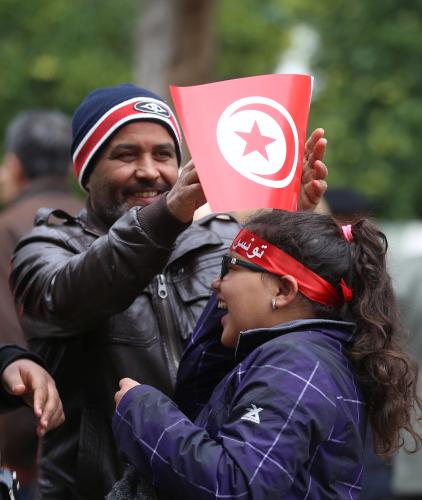Normally, we might see the potential end of a power-sharing agreement—one that has so far been central to Tunisia’s democratic transition—as something to lament. But it may be good news for Tunisian democracy, argue Sharan Grewal and Shadi Hamid. This piece originally appeared in Foreign Policy.
On September 24, Tunisian President Beji Caid Essebsi announced the end of a four-year alliance between his secular party, Nidaa Tounes, and the Islamist party Ennahda. The alliance between Essebsi and Ennahda’s Rached Ghannouchi began in a series of meetings in August 2013 that helped diffuse a crisis sparked by a political assassination. After Essebsi and his party won the 2014 elections, the consensus with the runner-up Ennahda was then codified in a grand coalition that has ruled to this day.
The two leaders, as different as can be, have been lauded for putting country over party. Who, after all, would argue against sharing power in a region where it’s so rarely shared? But while the world was celebrating Tunisia for its very real successes, the darker side of consensus was coming to light.
The alliance between Tunisia’s two largest parties has generally been justified on two fronts. First, Essebsi and Ghannouchi sought to quell the polarization that plagued Tunisia in 2013 and thereby prevent the transition from following Egypt down the road to democratic breakdown. Second, they believed the economic and security challenges facing the country required political stability and unity.
While the agreements struck in 2013 likely prevented a democratic collapse, the desire for consensus since then has undermined democracy in its own right. First, it has precluded a strong opposition. With over 80 percent of the parliament in the ruling coalition, there has been no real opposition to exert a check on the government. Accordingly, the ruling coalition has passed a series of problematic laws criticized by domestic and international civil society organizations for backsliding on human rights.
In 2015, for instance, Tunisia’s ruling coalition passed a counterterrorism law that featured an overly broad definition of terrorism—potentially encompassing peaceful political activity—and that allowed the detention of terrorism suspects without charge and without a lawyer for 15 days. In 2017, the coalition pushed through a reconciliation law that granted impunity to civil servants implicated in corruption under former autocrat Zine el-Abidine Ben Ali, even as surveys showed that a majority of Tunisians opposed the law. Despite protests by activists and opposition from civil society organizations, neither law could be stopped or significantly amended without a strong political opposition, and there wasn’t one. The one party that was large and organized enough to put pressure on the government—Ennahda—was in the government, invested in the government’s success, and intent on deferring to Essebsi and Nidaa Tounes. Too much consensus facilitated the counterrevolutionary tendencies and interests of Nidaa Tounes and the remnants of the former autocratic regime.
A second consequence of the politics of consensus has been to weaken the very notion of democratic representation. In 2012, Ennahda and Nidaa Tounes represented two seemingly opposite ends of the political spectrum: the former more Islamist and pro-revolution, the latter more secular and supportive of the Ben Ali regime. Four years of consensus have made the parties nearly indistinguishable, both attempting to counter terrorism through a largely securitized approach and to boost economic growth through IMF reforms.
With few policy differences between their political parties, Tunisians no longer feel represented by them. The 2018 Afrobarometer survey found that 81 percent of Tunisians do “not feel close to any political party,” and 79 percent either would not vote or would not know who they would vote for if elections were held tomorrow. This disillusionment with political parties was reflected in this year’s municipal elections, which saw a turnout of only 34 percent and where the largest vote-getters were independents. The underdevelopment of the party system, without credible platforms and projects and without a real, public contestation of ideas, has been a major casualty of consensus. In our fieldwork in Tunisia, we have repeatedly heard the same complaint from young Tunisians: that Westerners too often fetishize the country’s democratic progress without realizing that Tunisians have spent the last several years seeing two parties—and two old men—forging agreements and making decisions far away from the public glare.
Without representation or a credible opposition, Tunisians are increasingly turning to other means of expressing their dissent with the political process. Tunisia saw intense nationwide protests in January, while the influential Tunisian General Labour Union has threatened nationwide strikes later this month. The very instability that Essebsi and Ghannouchi had hoped to avoid through consensus is instead manifesting in an even less controllable form through regular protests of angry, frustrated youth. Moreover, these protests and strikes are further damaging the economy, creating a self-reinforcing cycle of government failure and political instability.
In recent months, the alliance between Essebsi and Ghannouchi came under strain as the result of Ennahda’s refusal to sack Prime Minister Youssef Chahed, who had been competing with Essebsi’s son Hafedh Caid Essebsi for leadership of Nidaa Tounes. Ennahda’s Shura Council has for the first time also publicly disagreed with Essebsi on a policy issue, rejecting his proposal for equal inheritance in August. Essebsi then announced the end of his alliance with Ghannouchi, though it remains to be seen whether Ennahda will move to the opposition or form a divided government with a new pro-Chahed splinter party. Either way, what is clear is that Ennahda no longer feels the need to move in lockstep with Essebsi.
Normally, we might see the potential end of a power-sharing agreement—one that has so far been central to the democratic transition—as something to lament. But it may be good news for Tunisian democracy. Its nascent party system would benefit from having both parties retreat to their voter bases and develop competing political and economic agendas ahead of the 2019 parliamentary elections. Such a separation, as painful as it may be, may be the best way to consolidate Tunisia’s democracy.
The Brookings Institution is committed to quality, independence, and impact.
We are supported by a diverse array of funders. In line with our values and policies, each Brookings publication represents the sole views of its author(s).







Commentary
Tunisia just lost its anchor of stability. That’s a good thing.
October 15, 2018